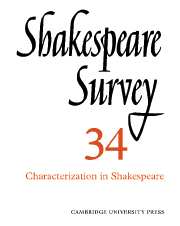Book contents
- Frontmatter
- Shakespeare’s Open Secret
- The Emergence of Character Criticism, 1774–1800
- Society and the Individual in Shakespeare’s Conception of Character
- Realistic Convention and Conventional Realism in Shakespeare
- On Expectation and Surprise: Shakespeare’s Construction of Character
- Shakespeare and the Ventriloquists
- The Rhetoric of Character Construction: Othello
- Characterizing Coriolanus
- The Ironic Reading of The Rape of Lucrece and the Problem of External Evidence
- The Unity of Romeo and Juliet
- No Abuse: The Prince and Falstaff in the Tavern Scenes of Henry IV
- Twelfth Night: The Experience of the Audience
- Plays and Playing in Twelfth Night
- Sceptical Visions: Shakespeare’s Tragedies and Jonson’s Comedies
- Shakespeare in Performance, 1980
- The Year's Contributions to Shakespearian Study 1 Critical Studies
- 2 Shakespeare’s Life, Times and Stage
- 3 Textual Studies
- Index
- Plate Section
The Ironic Reading of The Rape of Lucrece and the Problem of External Evidence
Published online by Cambridge University Press: 28 March 2007
- Frontmatter
- Shakespeare’s Open Secret
- The Emergence of Character Criticism, 1774–1800
- Society and the Individual in Shakespeare’s Conception of Character
- Realistic Convention and Conventional Realism in Shakespeare
- On Expectation and Surprise: Shakespeare’s Construction of Character
- Shakespeare and the Ventriloquists
- The Rhetoric of Character Construction: Othello
- Characterizing Coriolanus
- The Ironic Reading of The Rape of Lucrece and the Problem of External Evidence
- The Unity of Romeo and Juliet
- No Abuse: The Prince and Falstaff in the Tavern Scenes of Henry IV
- Twelfth Night: The Experience of the Audience
- Plays and Playing in Twelfth Night
- Sceptical Visions: Shakespeare’s Tragedies and Jonson’s Comedies
- Shakespeare in Performance, 1980
- The Year's Contributions to Shakespearian Study 1 Critical Studies
- 2 Shakespeare’s Life, Times and Stage
- 3 Textual Studies
- Index
- Plate Section
Summary
For some time now we have watched the ironic critics working their way through Shakespeare’s canon, demonstrating that his major characters must not be ‘taken at face value’, which invariably means that they must be taken at a good deal less than face value. One by one, thanks to their ‘new readings’, the heroes and heroines who seemed to be presented sympathetically have been exposed as ridiculous or reprehensible figures meant to evoke our antipathy. There was no reason to expect that Lucrece would escape this fate, and we now have several studies of the poem named for her which assert that she is not supposed to be viewed as an admirable model of chastity and fidelity, or even as a pathetic victim, but as one of the guilty parties. Although the authors of these studies differ in their indictment of her (one calls her crime ‘a little beyond forgiveness’, another finds it is ‘reciprocal’ with Tarquin’s), and in their manner of proving it, they usually claim to base their case, or at least a substantial part of it, upon historical grounds – upon a contemporary ‘perspective’ or ‘world view’, as they call it, which would have predisposed Shakespeare and his readers to condemn Lucrece. As evidence for this ‘perspective’ they cite a number of authoritative texts that stated or embodied it, including Petrarch, Landino, Fabrini, Tyndale, several books of the Bible, and above all St Augustine, whose attack on Lucrece (City of God, I, xix) they regard as decisive.
- Type
- Chapter
- Information
- Shakespeare Survey , pp. 85 - 92Publisher: Cambridge University PressPrint publication year: 1982

